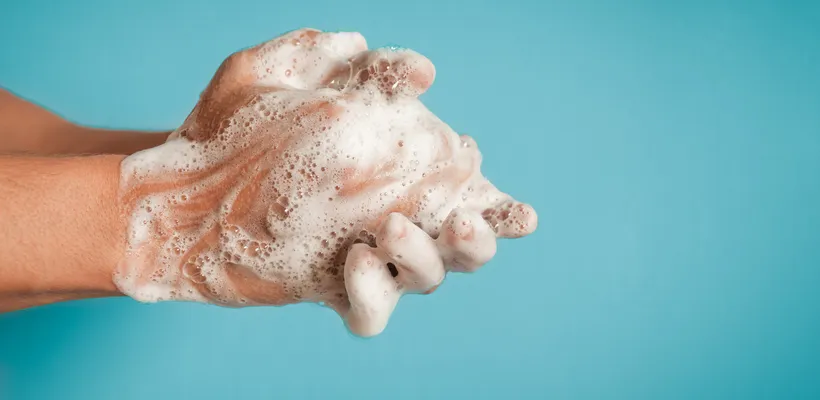Hygiene Tips to Help Prevent the Spread of Coronavirus

Published: 21st May, 2020 in: Health Health Advice
This article was accurate at the time and date of writing (13th May 2020). With coronavirus information, restrictions and guidance subject to change, please check the government's site for updated information.
With the COVID-19 outbreak changing normality for a while, we wanted to give you some tips on taking care of your personal hygiene during these difficult times. While restrictions and safety precautions may change frequently, there are some basic and easy ways to help take care of your wellbeing during these unpredictable times. With this in mind, it is more important than ever to practice good hygiene. This can help to reduce your risk of catching coronavirus and prevent the spread of the virus.
So what do you need to do to protect yourself?
Personal Hygiene Tips
Personal hygiene is one of the easiest and most effective ways of preventing the spread of many illnesses. This makes hand washing extremely important.
Hands come into contact with huge amounts of bacteria over the course of a day. Bacteria from anything we touch will be transferred onto our hands therefore, if you touch a surface or person with an infection, this can then be spread onto your own hands. If the coronavirus comes into contact with the nose, mouth or eyes, there is an increased chance of contracting the virus. As people very frequently touch their face throughout the course of a day, hand washing is important to ensure the virus is not spread from your hands to the face. To reduce the likelihood of falling ill or spreading the virus, you should wash your hands frequently and thoroughly with soap and water.
The NHS recommends that people wash their hands for at least 20 seconds with soap and water (or hand sanitiser if soap and water are unavailable). You should ensure that all areas of the hand have been washed, including in between the fingers, and under the fingernails. Ideally, you should use antibacterial soap, such as the Carex Complete Original Handwash. If you are unable to wash your hands, i.e. if you are at the supermarket or pharmacy, carrying a hand sanitiser gel with you is a good idea. This will allow you to ensure your hands are clean even on the go. Explore our range of hand gels and wipes. Hand gels such as the Pyramid Hysan Antibacterial Hand Gel help to defend against dangerous bacteria and germs, when water is not available. Everything you need to ensure your hands are as clean as possible can be found under hand hygiene at our online pharmacy.
Frequent hand washing and the use of hand gels can leave the hands sore and dry. This is because the moisture is stripped from the skin. You may want to use a moisturiser, such as the Neutrogena Hand Cream, to restore some of this moisture so you do not experience itchy, sore or uncomfortable skin. Our hand and nail care range has a wide variety of moisturising hand creams perfect for looking after your skin during this time.
In addition to hand washing, you should also be careful not to touch your face. In doing this, it becomes less likely that the virus will be contracted. This can be difficult as face-touching can be seen as an unconscious action however, making the conscious effort to avoid this can make a difference.
Finally, if you cough or sneeze, make sure to cover your nose and mouth fully, ideally with a tissue. You should then bin then tissue and wash your hands thoroughly.
Home Hygiene Tips
As previously mentioned, the COVID-19 virus can live on surfaces, causing further spread and an increased rate of infection. To counteract this, not only is personal hygiene important but home hygiene is also paramount. To lower the risk of infection, you should clean high-touch areas of your house regularly. This includes kitchen and bathroom surfaces, door handles, taps etc. Cleaning these properly with a disinfectant such as the Dettol Antiseptic Disinfectant will help to kill the virus and reduce the risk of contracting it from your home. When disinfecting you should allow the product to sit on the surface for a small while to give the product time to work. When cleaning, you should also ensure your cloth/mop/sponge is clean. If dirty before use, they will simply spread the germs. After use disinfect once again.
Soft furnishings such as carpets and sofas can also hold potentially harmful germs and viruses. These can be more difficult to disinfect however steam cleaners prove effective in killing germs.
In addition to the surfaces and furnishings in your home, your clothes may also pose a risk. It is not certain how long the coronavirus can live on clothes however, many clothes contain plastic/metal elements on which the virus is known to be able to live on, anywhere from a few hours to a few days. You should therefore wash clothes, towels and bedsheets frequently. When washing clothes, try not to shake dirty washing as this may spread harmful germs into the air. In addition to this, you should change into clean clothes when returning home from a public space such as a supermarket, and immediately wash the clothes you were wearing.
Further Advice
Tips from the government guidelines on how to stay alert during the COVID-19 outbreak.
- Stay home as much as possible. Only leave the house for essentials such as food and exercise.
- When leaving the house, ensure you stay at least 2m distance away from anybody else.
- If you have any symptoms of COVID-19 or come into contact with anybody that does, self isolate for at least 7 days if symptomless or until you have recovered completely.
For further advice or information, please check out the government support and guidance or contact the NHS on 111.